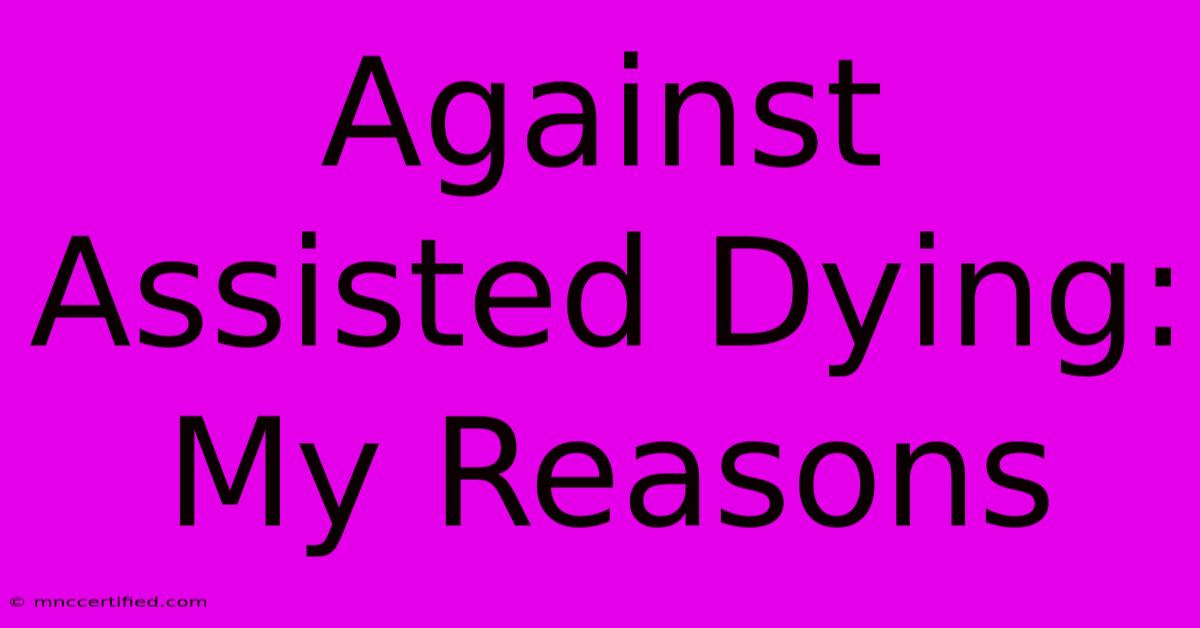Against Assisted Dying: My Reasons

Table of Contents
Against Assisted Dying: My Reasons
The debate surrounding assisted dying, or physician-assisted suicide (PAS), is complex and deeply emotional. While proponents emphasize autonomy and relief from suffering, I stand firmly against its legalization, based on a number of ethical, practical, and societal concerns. This isn't a simple dismissal of suffering; it's a careful consideration of the potential unintended consequences and a defense of the inherent value of human life.
The Slippery Slope Argument: A Valid Concern
One of the most frequently cited arguments against assisted dying is the "slippery slope." While often dismissed as scaremongering, the concern is valid. Legalizing PAS for terminally ill patients with unbearable suffering could potentially lead to its expansion to encompass broader categories of individuals. This could include those experiencing severe depression, disabilities, or those facing difficult, but not necessarily terminal, situations. The line between unbearable suffering and simply unwanted life becomes incredibly blurry, opening the door to coercion and abuse. This is particularly concerning for vulnerable populations like the elderly, the disabled, and the marginalized who may feel pressured to choose death over navigating challenging circumstances.
The Problem of Inaccurate Diagnosis and Changing Circumstances
Medical science, while advanced, isn't infallible. Diagnoses can be wrong, and prognoses can change. A patient choosing assisted dying based on a particular prognosis might find that their condition improves, or that advancements in treatment offer new hope. Irreversible decisions made based on incomplete or inaccurate information have potentially devastating consequences. The permanence of death leaves no room for error or changing circumstances.
The Role of Palliative Care: Addressing Suffering Effectively
Many proponents of assisted dying argue it's a solution for unbearable suffering. However, effective palliative care offers a powerful alternative. Palliative care focuses on managing pain and symptoms, providing emotional support, and improving quality of life for individuals facing serious illness. Investing in and expanding access to high-quality palliative care is a far more humane and ethically sound approach than offering the option of death. It addresses the root of the problem—the suffering—rather than simply ending the life of the sufferer.
The Erosion of Trust in the Medical Profession
Legalizing assisted dying could also erode trust in the medical profession. Doctors are entrusted with the sacred responsibility of preserving life. Introducing the option of assisted dying could create a conflict of interest, potentially blurring the lines between healer and ender of life. This shift could undermine the fundamental role of medicine and its commitment to healing and caring for patients.
Protecting the Vulnerable: Preventing Coercion and Abuse
The potential for coercion and abuse is a significant ethical concern. Individuals facing pressure from family members, caregivers, or even society to end their lives might feel compelled to choose assisted dying despite their own reservations. The vulnerable are particularly susceptible to such pressures, making the need for robust safeguards and protections paramount. The legal and ethical framework required to prevent such abuses would be incredibly complex and potentially ineffective.
Conclusion: A Moral Imperative to Preserve Life
The arguments in favor of assisted dying are understandable, particularly when dealing with immense suffering. However, the potential risks and unintended consequences associated with its legalization far outweigh the perceived benefits. We must prioritize investing in improved palliative care, supporting those facing life-threatening illnesses, and ensuring robust safeguards against coercion and abuse. Our moral imperative is to preserve human life, not to facilitate its ending, even in the face of immense challenges. Focusing on compassionate care and support, rather than assisted suicide, is the ethically sound and ultimately more humane path forward.

Thank you for visiting our website wich cover about Against Assisted Dying: My Reasons. We hope the information provided has been useful to you. Feel free to contact us if you have any questions or need further assistance. See you next time and dont miss to bookmark.
Featured Posts
-
Ps 5 Game And Accessory Deals Black Friday 2024
Nov 30, 2024
-
10 Bond St New York Ny 10012
Nov 30, 2024
-
Geoff Schwartzs Week 14 College Football Picks
Nov 30, 2024
-
Wisconsin Vs Minnesota Live Stream Guide
Nov 30, 2024
-
Ashley Alban Sibling Bonding
Nov 30, 2024